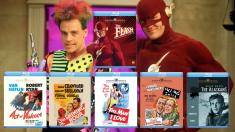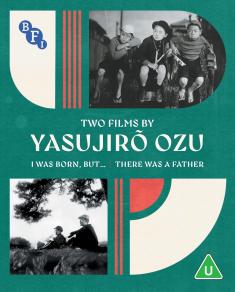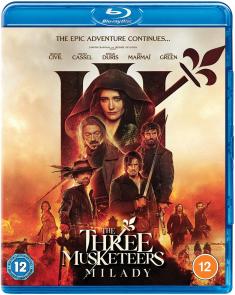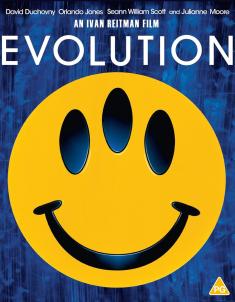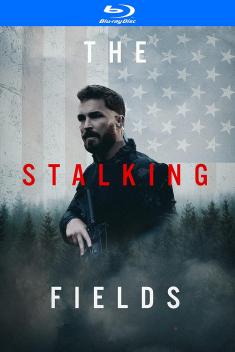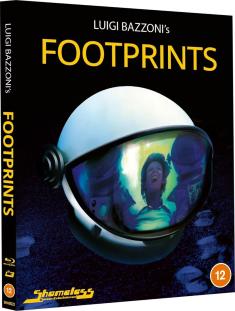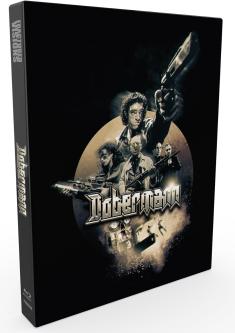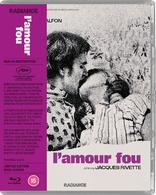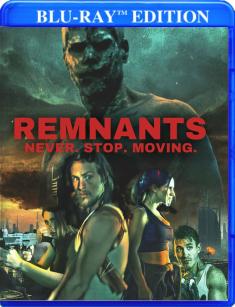Pierrot le fou
Overview -
Dissatisfied in marriage and life, Ferdinand (Jean-Paul Belmondo) takes to the road with the babysitter, his ex-lover Marianne Renoir (Anna Karina), and leaves the bourgeoisie behind. Yet this is no normal road trip: genius auteur Jean-Luc Godard's tenth feature in six years is a stylish mash-up of consumerist satire, politics, and comic-book aesthetics, as well as a violent, zigzag tale of, as Godard called them, “the last romantic couple.” With blissful color imagery by cinematographer Raoul Coutard and Belmondo and Karina at their most animated, 'Pierrot le fou' is one of the high points of the French New Wave, and was Godard's last frolic before he moved ever further into radical cinema.
Storyline: Our Reviewer's Take
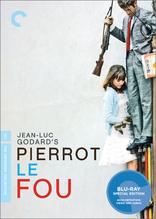
"A story. All mixed up."
The films of Jean-Luc Godard are an acquired taste, to put it lightly. I'm not certain that I've acquired it yet. The director's early works like 'Breathless' and 'Alphaville,' in which he attempted to put a European art-film spin on recognizable Hollywood genres, are generally his most accessible and, frankly, coherent. By the mid-1960s, he'd begun to lose interest in traditional narrative forms. Instead, he started to value improvisation, and focused on creating specific moods or atmospheres rather than plots or character development. 'Pierrot le fou' (literally, "Pierrot the crazy") is a transitional work. The film began production as a lovers-on-the-run tale along the same lines as 'Breathless.' Not far in, Godard decided to throw away the script and rewrite each scene the night before shooting. At the same time, his marriage to star Anna Karina was crumbling, and that became a theme he couldn't resist incorporating into what threads of story remain in the finished work.
French screen idol Jean-Paul Belmondo stars as Ferdinand, a middle-aged, unemployed intellectual discontent with what he perceives as the shallow bourgeois values of his family and friends. One night, while driving home the babysitter Marianne (the lovely Karina), the two decide to run off together to the south of France. The girl insists on calling him "Pierrot" for reasons that are never explained. He corrects her every single time. Along the way, Ferdinand/Pierrot discovers that Marianne is somehow mixed up with gun runners. Out of money and suffering from growing antisocial tendencies, they lie, cheat, steal, and murder their way to the coast, where their new unhappy lives together can commence.
Keep in mind that the summary I've just written, although obviously simplified, is also significantly more linear and logical than anything you'll find in the film itself, which basically amounts to a series of random nonsensical scenes strung together in no particular order. With this movie, Godard attempts to deconstruct the language of cinema. Pieces of the story are presented completely out of order. What should be major critical events are either shown out of context or not shown at all. Characters repeatedly break the fourth wall by speaking directly to the camera or referencing the audience's existence. Marianne has a habit of bursting into song like a musical, but Godard refuses to indulge in the expected musical conventions such as choreography or even clear audio recording. He allows Karina to wander off camera and out of microphone range. Surreal and satirical elements, like topless women lounging about at a formal dinner party while other guests converse entirely in commercial and advertisement clichés, intrude all over. The director also emphasizes the artifice of things like driving scenes (that are obviously stagebound), sound effects (that are routinely missing when needed), and a musical score (that cuts in and out at random). Character dialogue is heavy on pretentious philosophizing and reiterating the artistic themes of the film.
In my experience, this is the sort of thing that you're either in the mood for or not. There was once a time, back in my film school days, when I really thought that 'Pierrot le fou' was terrific. I placed it significantly above 'Breathless' in Godard's canon. Honestly, I expected that opinion to hold up. Quite the opposite, this most recent viewing left me completely cold. The best fractured-narrative movies of this sort (I'm thinking of the films of Federico Fellini, Luis Buñuel, and David Lynch; or more recently a movie like 'Donnie Darko'), even when they don't make much logical sense, manage to speak to a greater emotional truth that can take the viewer on a satisfying journey. Godard's approach to 'Pierrot le fou' is very aloof and detached. He obviously holds his characters in open contempt – Marianne (and hence Karina) for being such a heartless, selfish bitch, and Pierrot (thus himself) for being such a damned fool that would ever fall for her.
Is this a brilliant masterwork, or a load of pretentious nonsense? Maybe it's both. Ask me again in another fifteen years and we'll see how I feel about it then.
The Blu-ray: Vital Disc Stats
'Pierrot le fou' has been added to The Criterion Collection as spine #421. The Blu-ray edition comes packaged in a clear keepcase, and includes a 43-page booklet. Unlike other studios, Criterion does not program any obnoxious trailers or promos before the main menu.
Video Review
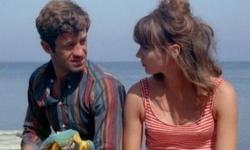
According to the liner notes in the enclosed booklet, Criterion's 1080p/AVC MPEG-4 transfer was supervised by the film's cinematographer, the legendary Raoul Coutard. There's very little to fault about the work here. The 2.35:1 picture is bright and clear. In fact, for a movie with such dark themes, the photography is quite unexpectedly bright and sunny throughout. The image is sharp and satisfyingly detailed, if not necessarily razor sharp. Dirt and age-related defects have been almost entirely removed.
For the most part, colors appear clean and accurate. A few heavy color washes early in the film make the picture look fuzzy. That may possibly be an issue with the original film stock or color timing. Light film grain is present and well-rendered. For a 40-plus year-old movie, this is a very impressive and film-like transfer that really conveys the experience of watching a projected film print.
Audio Review

The French PCM 2.0 mono soundtrack is more a victim of its age and the director's sound design idiosyncrasies. Much of the audio in the film comes from the raw production recordings, without a lot of ADR or foley work. This means that the actors frequently stray from microphone range, and some important sound effects are just outright missing. The supplements on the disc explain that Godard instructed that the audio be mixed "live" in one sitting, so that the sound mixer would have to react emotionally to events on screen, without time to overthink or retract his initial decisions. As a result, levels are all over the map, even within individual scenes.
The audio has been cleaned of analog hiss, though camera whir is occasionally audible in some ambience. Fidelity of the track is often thin, especially musically. Dialogue is also scratchy at times. Still, for what it is, this is probably the best that 'Pierrot le fou' has ever sounded.
Optional English subtitles are contained entirely within the 2.35:1 movie image, and are safe for viewing on Constant Image Height projection screens.
Special Features
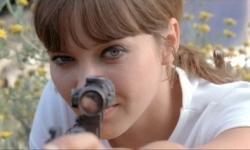
Criterion's DVD and Blu-ray share the same assortment of supplements. Although most of the features on the Blu-ray are encoded at 1080i resolution, they have clearly been upconverted from standard-def NTSC or PAL sources.
- Booklet – The 43-page booklet included with the disc contains an essay by 'New Yorker' film critic Richard Brody, a 1969 essay by esteemed critic Andrew Sarris (then at 'The Village Voice'), and a 1965 'Cahiers du Cinéma' interview with Jean-Luc Godard.
- Anna Karina (SD, 15 min.) – In this 2007 English-language interview, the actress looks back on her role in the film and the experience of working with her ex-husband, who she clearly still respects as an artist. Karina was 67 when this interview was recorded, but looks about 90. That's what cigarettes do to you, kids.
- A Pierrot Primer (SD, 36 min.) – I was really hoping that his selected-scenes commentary by filmmaker and university professor Jean-Pierre Gorin would help to shed some light on how to interpret parts of the movie. Unfortunately, Gorin's accent is very thick, and his comments are extremely pretentious and off-putting. Honestly, I gave up after 10 minutes. My wife heckled me for hanging in that long.
- Belmondo in the Wind (SD, 9 min.) – This vintage 1965 interview finds the actor, as well as director Godard and co-star Karina, reflecting on his on-screen persona, his relaxed attitude, and his distaste for Method acting. The piece is in French, and unfortunately defaults to playback without subtitles (which must be turned on manually).
- Venice Film Festival, 1965 (SD, 4 min.) – Vintage excerpts from festival interviews recorded for an entertainment program. Godard responds to questions about whether he's a provocateur.
- Godard, L'Amour, La Poésie (SD, 53 min.) – This very interesting French documentary from 2007 provides an overview of Godard's and Karina's marriage, careers, and working relationship.
- Trailer (SD, 2 min.)
Films like 'Pierrot le fou' are next to impossible to judge on any sort of objective scale in comparison to other movies. Depending on your affinity for this sort of thing, either it's an essential work of cinematic genius, or a bunch of crap. My own opinion of it has swung wildly over the years, to the point that I have no idea at all how to score it on the film critic's required five-star scale. The best I can do is pick a rating somewhere slightly above center and hope that I haven't offended too many people one way or the other.
Whether you wind up liking the movie or not, Criterion has rightly recognized it as an important work in the career of a notable filmmaker. Their Blu-ray edition treats it with the respect necessary to allow each viewer to judge it for him- or herself. The high-def video looks excellent, and the disc includes several informative bonus features. Adventurous film buffs will find it worth a look.
